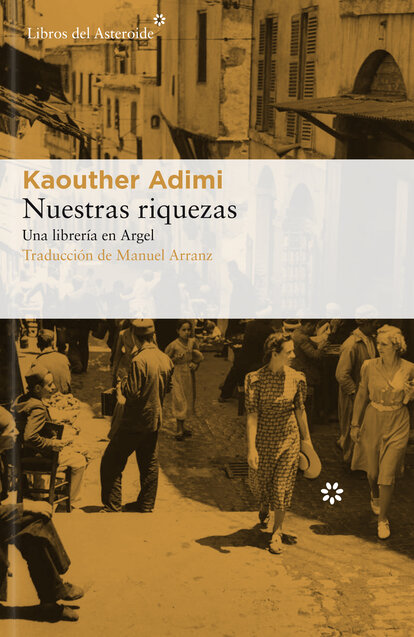Literature
Mediterranean coasts of the literature

To speak of Edmond Charlot is to sing the song for the dream of a trans-Mediterranean literature. The melody becomes an elegiac whistle: is it still possible? Born in Algiers on 15 February 1915 and died in Béziers on 10 April 2004, Edmond Charlot tried to do so all his life. Between these two dates, he embodied a vision of humanism for the Mediterranean. He was a bookseller rather than a publisher in his charming little bookshop, Las Verdaderas Riquezas, in Algiers, named after the title of a novel he admired by Jean Giono. In his tiny shop, with an echo of time that still looks back on us, he exhibits works of art and becomes a key figure in French cultural action, not only in North Africa or Algeria, but throughout the Mediterranean. He was so enthusiastic about being a bookseller that he decided to go one step further: to become a publisher. Thus, in May 1936, with a print run of 500 copies, he published the play Rebellion in Asturias, co-written by Jeanne-Paule Sicard, Yves Bourgeois, Alfred Poignant and Albert Camus. Censorship prevented the play from being performed, and it was then that Edmond Charlot decided to publish it: thus began his adventure, and his passion, as a publisher. Charlot will be remembered as one of Camus' great friends: but he will also have been his publisher, his confidant, his accomplice in the most difficult hours, between wars, successive shortages and arbitrary arrests by successive powers, before and after the Second World War. The young Albert Camus would often sit on this little step at the entrance to the 2 B of what is now Rue Hamani, which in the days of Charlot and Camus was still called Rue Charras, to revise his first manuscripts after having discussed them with Charlot. We are talking about this kind of characters: those who play the leading role and live, but also inaugurate, this inner focus of a new time.
Stimulated by his reading of Gabriel Audisio, the bookseller and publisher Edmond Charlot decided to launch his collection of Mediterranean classics. Not by nationalities, not by countries, not by religions: by that link of our sea which also unites Charlot with one of the great Spanish writers, who will also return: Vicente Blasco Ibáñez. But let us continue with Edmond Charlot, that precursor of a real, vertebral idea: that the sea unites us in that enormous, sensory, porous force of golden bodies under the sun, between winds from the desert like a latitude offered to mystery. Gabriel Audisio, who was so much read by Edmond Charlot - and about whom he talked a lot with Camus - sees the Mediterranean as an eternal mirror that brings us that primordial heartbeat of the Greeks and Romans, from Homer and Aeschylus to Virgil and Lucan: this is the origin of his collection Méditerranéennes, also in 1936, in which he published, in addition to his friend Albert Camus and his great inspiration, Gabriel Audisio, Jean Grenier and Federico García Lorca. It was for the same purpose that he launched a new review, with a name that was evocative but also precise in its determination: Rivages, i.e. Costas, to highlight the whole of Mediterranean culture. Mobilised by the French army - like so many thousands of Algerians - during the Second World War, he would not only witness the hardships of Vichy France, but also the harsh war of Algerian independence, which would devastate the world he had always believed in.

Edmond Charlot's story is so powerful that the brilliant young Algerian storyteller Kaouther Adimi has dedicated to him a novel as short as it is splendid: Our Riches, Prix Reanaudot des Lycéens 2017, Prix du Style 2017 and a finalist for the Goncourt and Médicis prizes. Kaouther Adimi, like Edmont Charlot, was also born in Algiers. Although it is already a very different Algiers: the Algiers of 1986, just as the Algiers of today, which also appears in his novel, is different. Like so many young Algerians who have had this opportunity, Kaouther Adimi lives in France. But she distinguishes the chiaroscuros of the relations between the two countries - she narrates some very terrible ones, such as the massacre of Algerians in Paris in 1961, with an aseptic and powerful crudeness - while evoking the Algiers that could have been: the same Algeria and the same Mediterranean, rocked by the common cultural waters, although also different in their nuances, that Edmond Charlot once dreamt of.
We are familiar with current European Mediterranean literature: the French Emmanuel Carrère, Delphine de Vigan or Pierre Michon, the Italian Alessandro Baricco or the Greek Petros Márkaris are all too familiar to us. But we must look at the other side of the sea, that other great literature that shapes Edmond Charlot's dream, with authors such as Kaouther Adimi herself or the Moroccan Leila Slimani, with marvellous novels such as Sweet Song - 2016 Goncourt Prize - or The Country of the Others. But there are many, there are many more.

Alexandria, Kavafis. More Algerians: Yasmina Khadra. Boualem Sansal, Kamel Daoud. The Spanish-Moroccan Mohamed El Morabet and The Winter of the Goldfinches. Sensuality, beauty, a commitment to the freedom of women and men in the shadows of these waters that are not always twinned, nor always free. Only reading and writing will save us. That is why as a Spanish writer, I declare myself an admirer of Odysseus' founding voyage across our wild sea, with stories latent in its rocks, and of that other new foundation which was Edmond Charlot's vision of a literature that would cross our Mediterranean to bring dreams closer to the shore.
Joaquín Pérez Azaústre (Córdoba, 1976) has a degree in Law, is a writer and cultural manager. A contributor to media such as El Mundo and Diario Córdoba, he is the director and scriptwriter of the podcast No eran molinos. Clásicos de Literatura Española on RTVE. His collections of poems have won the Adonáis, Loewe and Jaime Gil de Biedma awards. He has published novels such as Los nadadores (Anagrama, 2012, translated into several languages), Atocha 55 (Almuzara, 2020) and La larga noche (Almuzara, 2022, Jaén Novel Prize), about Manolete's last dawn. His next novel will be El querido hermano (Malaga Prize, to be published by Galaxia Gutenberg in 2023), about Manuel and Antonio Machado.
